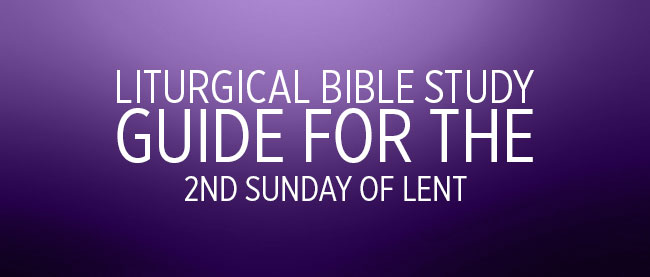Gospel – Luke 9:28b-36
The story we hear today we will hear again on August 6th, the Transfiguration of Christ. The time is about one year prior to Jesus’ death and resurrection. He has fed the five thousand, fed the four thousand, walked on water, delivered His bread of life discourse, and Peter has made his revelation at Caesarea Philippi “You are the Christ.” Jesus has just bestowed upon Peter the name of Rock (kepha), promised to build His church upon this rock, and given Peter the ability to bind and loose. About eight days after this, today’s reading occurs.
1st Reading – Genesis 15:5-12, 17-18
In today’s first reading we hear of God’s first covenant with Abram. In Genesis 12:1-2, God had made a three-fold promise of blessing to Abram: nationhood, dynasty (name), and worldwide blessing. These promises were then secured by covenants.
Abram was called at the age of 75 when the Lord told him “Leave your country, your people and your father’s household and go to the land I will show you” (Genesis 12:1). Abram obediently set out with Sari his wife, Lot his nephew, and all the possessions and servants (slaves) they had acquired and went to Canaan. Canaan was occupied by the descendants of Canaan the son of Ham (who was one of the three sons of Noah) and brother of Cush, Egypt, and Put. Canaan was cursed by Noah because of his (Canaan’s) father’s actions when he discovered Noah drunk in his tent (Genesis 9:25). Because of the curse, the Canaanites were thought to be subject people of the Semites (descendants of Shem, the firstborn of the three sons of Noah). After living in Canaan, Abram fled to Egypt to escape the famine in Canaan. While in Egypt Abram passed Sari off as his sister and she was incorporated into Pharaoh’s harem. Because of this, God inflicted serious diseases upon Pharaoh and his household. Pharaoh then learned of the deception and expelled Abram and Sari and all their possessions.
Abram and Lot then separated and Lot went to live near Sodom while Abram returned to Canaan. Four kings defeated five kings (an indication of their power) and took Lot prisoner. Upon hearing of Lot’s capture, Abram took his 318 trained men and defeated the four kings who had defeated the five kings.
When he returned, he was blessed by Melchizedek, the king of Salem and priest of God Most High. Hebrew tradition has it that Melchizedek was Shem. If this was the case, the blessing was the blessing of the firstborn son of Noah; the same blessing which was later fought over by Esau and Jacob.
This brings us up to the time of our reading today, some 10-11 years after Abram started on his journey. Abram (the name means “father who is exalted”) and Sari remain childless although God had promised him the first time he arrived in Canaan that He would give the land to his offspring. Abram has despaired to God that he has no offspring and that his servant will inherit his estate. God now makes His promise into a covenant.
2nd Reading – Philippians 3:17-4:1
Our epistle reading today comes from Paul’s warning against false teachers. The adversaries would seem to be Judaizers – itinerant preachers, who in the name of a higher perfection seek to impose upon Gentile converts the Levitical practices which were outdated (abrogated) by the new covenant; the covenant by which we were made children of God and were no longer His slaves.


